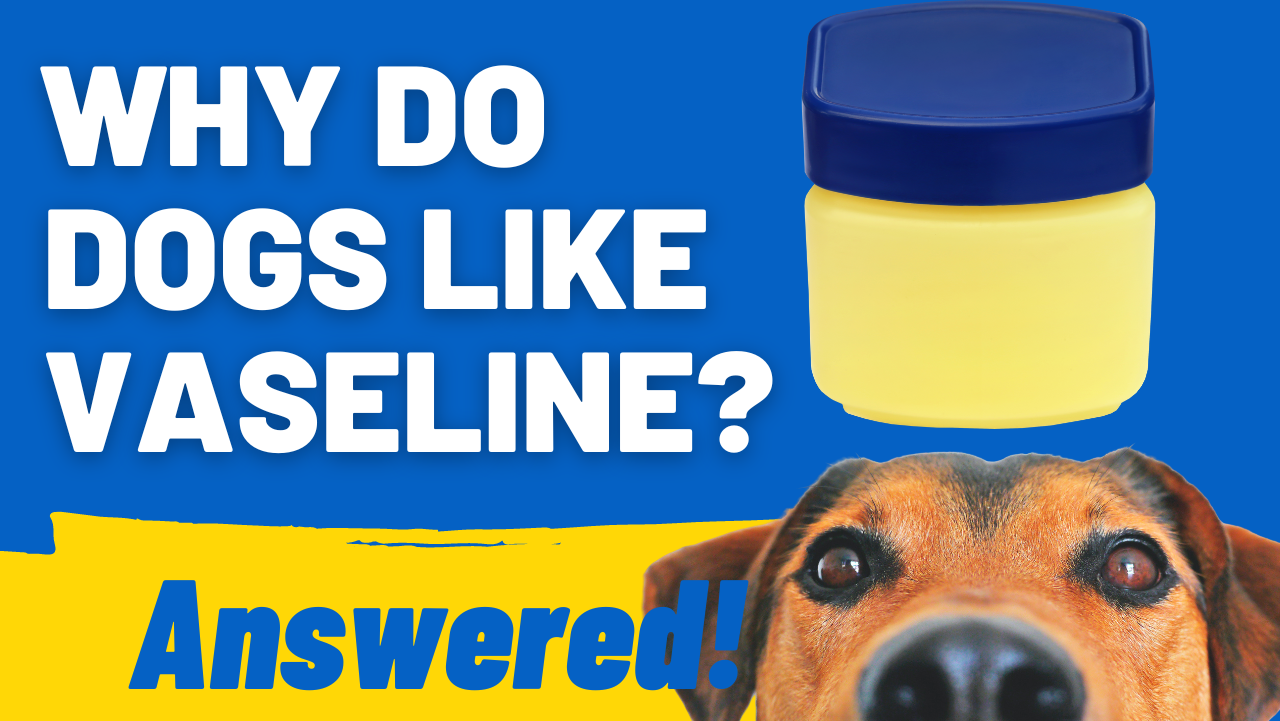Using Vaseline or Aquaphor to treat your dog’s cracked nose and dry paws is a common home remedy. The problem is that many dogs seem to have an affinity for licking off those petroleum jelly products. This begs the question: why do dogs like Vaseline?
Dogs are notorious for licking and consuming non-food items that we wouldn’t dream of eating. These non-food items include Vaseline and other petroleum jelly-based products. Luckily, Vaseline and Aquaphor aren’t particularly harmful to dogs.
Still, these products can have some effects on your dog’s tummy that you should be aware of.
In this post, we’ll explore in-depth the reasons why dogs like Vaseline and other petroleum jelly-based products. We’ll also lay out the effects they have on dogs’ digestive systems, so stick around.
Is Vaseline Harmful to Dogs to Lick?
If your dog licks Vaseline, you have no reason to worry. Vaseline is non-toxic for dogs, so it shouldn’t cause any critical health issues. After all, Vaseline is made from 100% petroleum jelly, which isn’t harmful to dogs. It’s also triple-purified to remove any cancer-causing impurities.
That said, Vaseline isn’t harmless either. If over-ingested, it can have a laxative effect on your dog’s stomach. In the best-case scenario, your dog will have a bit of a runny stomach.
However, if a dog ingests a fair amount of Vaseline, it can cause an upset stomach, vomiting, or diarrhea. Excessive diarrhea and vomiting in dogs can result in severe dehydration and electrolyte imbalances, which require immediate veterinary care.
That’s why, even though ingesting Vaseline is rarely harmful, most veterinarians recommend taking your dog to the vet if he ingests Vaseline. Your vet should evaluate your dog’s health and condition to determine the best course of action.

What About Aquaphor?
Aquaphor is another petroleum jelly product that’s often recommended as a last-resort moisturizer. However, unlike Vaseline, Aquaphor only contains 41% petroleum jelly. Other main ingredients include panthenol, glycerine, mineral oil, ceresin, bisabolol, and lanolin alcohol.
Still, there’s no need to panic if your dog licks the Aquaphor off his paws. Aquaphor’s ingredients aren’t toxic to dogs. So, ingesting a small amount of the product won’t harm your dog.
It’s a different story if your dog consumes a large amount of Aquaphor. Petroleum jelly, mineral oil, glycerin, and panthenol can all act as laxatives. As a result, eating an excessive amount of Aquaphor can cause stomach pain, vomiting, and diarrhea.
What’s more, if your dog is allergic to any of the ingredients in Aquaphor, he may experience:
- Difficulty breathing
- Vomiting
- Severe diarrhea
- Loss of appetite
- Lethargy
Because the symptoms of ingesting too much Aquaphor and having an allergic reaction are similar, you should take your dog to the vet right away.
Do Dogs Like Petroleum Jelly?
Dogs typically neither like nor dislike petroleum jelly. They just often develop peculiar appetites like this all the time. So, some dogs may develop a strong preference for licking and eating petroleum jelly products.
There might be a scientific explanation for why some dogs like petroleum jelly products, though. Dogs like high-fat foods, and petroleum jelly is a purified mixture of hydrocarbons (fat-like molecules). So, it’s likely that petroleum jelly smells and tastes like food to your dog.
That said, not all dogs will enjoy licking petroleum jelly. Some dogs like licking lotion, while others like licking sunscreen. So, each dog’s affinities are unique to him.
Why Do Dogs Lick Vaseline and Lotion?
Your dog licks you after you’ve applied Vaseline or lotion because he loves you. However, dogs may lick Vaseline and lotion for a variety of reasons, including:

Curiosity
Dogs, especially puppies, may lick various items to explore their surroundings. So, a dog may like licking Vaseline, lotion, or Aquaphor because it has a new smell and texture to them. What’s more, your dog may lick flavored products because they smell and taste like food.
Habit
It’s common for dogs to eat inedible items from time to time. However, non-food eating habits or compulsions may indicate an underlying psychological or medical condition. In this case, you should take your dog for a check-up.
Boredom
Dogs are easily bored due to their intelligence. Licking themselves is one way they can relieve boredom. So, if your dog licks off the Vaseline or lotion you applied to his nose or paws, it’s possible that he’s just bored—regardless of what he’s licking.
Stress
Some dogs comfort themselves from stress by licking themselves. Other dogs chew on or eat non-food items. In either case, you should try to identify and eliminate the source of your pup’s stress.
Can Vaseline Help Dogs?

Vaseline is a common home remedy that many dog owners use to treat a variety of issues. The problem is that Vaseline doesn’t have any real benefit.
Doesn’t Moisturize Skin
Vaseline is an occlusive moisturizer. This means that it creates a surface barrier on the skin. As a result, Vaseline can only lock any existing moisture onto your dog’s nose and paws to prevent drying out. However, it neither moisturizes nor heals them.
Another issue is that the Vaseline barrier can trap bacteria and fungi, leading to skin infections.
At a pinch, a thin layer of Vaseline won’t harm your dog. However, make sure to get a moisturizing lotion for your dog’s skin as soon as possible.
Not the Best Constipation Remedy
Vaseline is well-known among dog parents and even vets for its ability to relieve constipation. This remedy is technically effective, but there’s no recommended dosage.
So, if you give your dog Vaseline for constipation, you run the risk of causing severe vomiting and diarrhea, as well as other health issues.
Not the Best Fleas, Ticks, or Mites Remedy
An odd but common use of Vaseline is to treat a flea or tick infestation in dogs. However, Vaseline can make the problem worse.
In case of a tick infestation, using Vaseline can cause the ticks to regurgitate saliva on the dog, increasing the risk of infection.
As for a flea infestation, you can comb the fleas out with Vaseline, but this process is time-consuming and messy. Not to mention that it doesn’t eliminate fleas permanently.
Some pet owners may also recommend Vaseline to remove ear mites or other parasites from dog ears. While Vaseline might suffocate some ear mites, it won’t reach those deeper in the ear canal. Vaseline can also cause an ear infection by sealing bacteria and fungi inside.
Is Petroleum Toxic to Dogs?
While petroleum jelly is a derivative of petroleum, they’re not the same. To begin with, petroleum jelly isn’t toxic to dogs. Petroleum, on the other hand, is toxic to dogs.
So, exposure to petroleum products via inhalation, ingestion, or direct skin contact can result in poisoning in dogs, which can be life-threatening.
Symptoms of petroleum product poisoning include:
- Fever
- Vomiting
- Diarrhea
- Excessive salivation
- Difficulty breathing
- Champing of jaw
- Irregular heartbeat
- Trouble walking
It’s crucial to note that not all petroleum jelly products undergo the same refining process as Vaseline and Aquaphor. So, they could still contain toxic chemicals and carcinogenic materials.
In Conclusion
Luckily, Vaseline isn’t toxic to dogs and won’t cause more than a mild stomach ache in most cases. Still, it’s best to consult with your veterinarian if your dog eats Vaseline or Aquaphor, especially if your dog exhibits any physical or behavioral changes.
And remember: it’s always best to use pet-specific products rather than home remedies like Vaseline, Aquaphor, or lotions.




